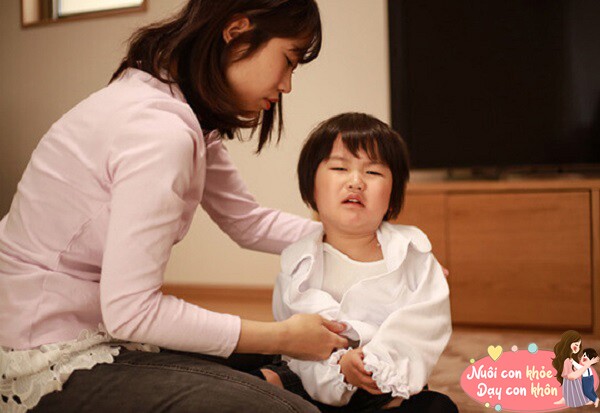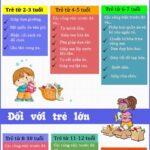While love is essential, it can become controlling and imposing, turning into a burden that stifles a child’s freedom and confidence to explore and discover themselves.
Mothers should also have a broader perspective, beyond just caring and protecting their children. They need to empower their children to build independent and meaningful lives.
Mothers are advised to persistently apply the principles of “3 don’ts in speaking, 3 don’ts in assisting, and 3 don’ts in tolerance” when teaching their children.

Refrain from excessive talking; learn to encourage instead
Looking at the family as a whole, each member has their own unique personality and goals, and encouragement is essential. However, we often fall into the habit of negating. There are three things mothers should refrain from saying to their children.
Don’t scold your child in public
Disagreements and issues between parents are inevitable, and it’s important to communicate privately and present a positive image to your children. A healthy family environment requires mutual understanding and respect among all members. Parents should resolve conflicts skillfully and discreetly.
Additionally, refraining from scolding your child in public is a crucial aspect of education. Being reprimanded in front of others can cause embarrassment, hurt, and a loss of confidence.

Refrain from scolding your child in public.
Instead, choose an appropriate time and private space to discuss your child’s inappropriate behaviors. This way, your child will feel respected and have the opportunity to better understand the reasons behind your correction.
Don’t discuss your child’s weaknesses in front of others
Constantly talking about your child’s weaknesses in front of others can damage their self-confidence. They may feel embarrassed or develop a negative self-image.
When a child loses confidence, they may also lose sight of their goals and hopes.
Minimize complaining about minor life issues
Some mothers tend to complain frequently about minor daily issues. This may include criticizing how your child arranges their belongings, cooks, or even their small habits.
This creates a tense atmosphere, putting family members under pressure and making them feel uncomfortable. When a child constantly hears complaints and criticism, they lose their sense of hope and joy.

Three things to refrain from doing too quickly: Let your child learn to be independent
Relying on others is not as beneficial as relying on oneself. This is the foundation for success in life.
If a mother becomes the primary source of dependence, the child’s future development may be hindered.
Don’t help with tasks your child can do independently
At a certain age, children should take on responsibilities within their capabilities instead of relying on their mother’s assistance. This includes doing homework, reading, fetching water, or even resolving conflicts with playmates.
By performing these tasks independently, children learn time management, situation analysis, and decision-making skills.

Refrain from doing things your child can do independently.
Don’t make decisions for your grown-up child
Offer advice instead of making decisions for them. By guiding your child to approach issues critically, you foster the development of their critical thinking and decision-making skills.
Sometimes, let dad teach the right things
Many mothers tend to side with their children when the father wants to discipline them. This may be due to differing parenting perspectives, experiences, and values. In many families, the mother is often the primary caregiver and spends more time with the children, so it’s understandable that she feels protective.
However, there are times when mothers need to step back and let fathers teach their children the right things. This helps children understand that both parents play equally important roles in their upbringing. While their approaches may differ, they both contribute to the child’s well-being.

Three things mothers should not be too tolerant of
When your child breaks other people’s belongings
When a child breaks someone else’s belongings, it can lead to unwanted consequences. In such situations, it’s crucial for mothers to remain calm and not overreact. However, discipline is still necessary. Find a way to explain to your child the importance of respecting others’ possessions and the concept of shared responsibility.
Use this as an opportunity to teach your child about accountability and the impact of their actions.
When your child argues and uses inappropriate language
Children are learning to express themselves and explore the boundaries of language. Arguing may be their way of seeking attention, expressing disagreement, or simply asserting their individuality.
However, if left unmanaged, it can lead to more serious issues, such as a lack of respect for authority or peers. Therefore, mothers need to be patient and employ appropriate educational measures.

When your child exhibits inappropriate behavior, be firm and corrective.
When your child relies on the indulgence of others
It’s natural for children to rely on the indulgence of others, such as grandparents, fathers, or siblings, as it reflects cultural values and family traditions.
For example, grandparents often show their love and affection by spoiling their grandchildren with toys, treats, or even overlooking their mischievous behavior.
However, if children become too dependent on this indulgence, it can lead to unwanted consequences. When children feel that their demands are always met without any effort or rules, they may develop a sense of entitlement and a lack of appreciation.
This can also create conflict when parents try to establish discipline and set boundaries.






































